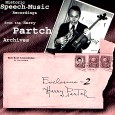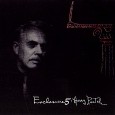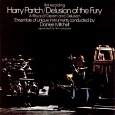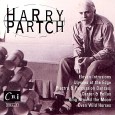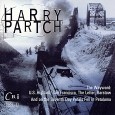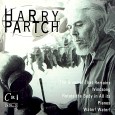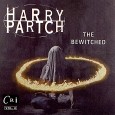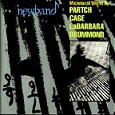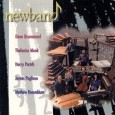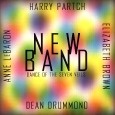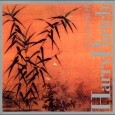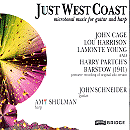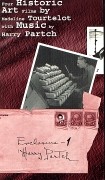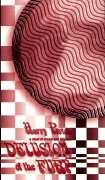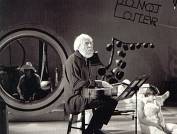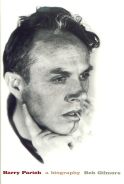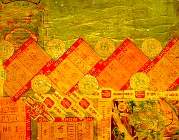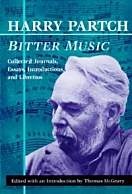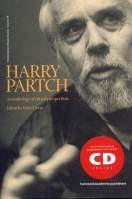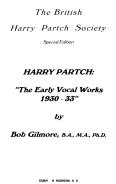
|
|
| The Meadows Guide to Partch Recordings, Videos and Books Seriously: when I started the Meadows in 1996, there was almost nothing to list here. Now, a few years (and a couple of major projects) later, virtually everything Partch wrote and recorded is available, a good portion of it for the first time. My purpose on this page is to include everything you would need for a complete study and portrait of Partch's work and life; I include my recommendations, for those new to Partch, at the end of the page. Links to online sources, primarily Amazon, are included. We haven't sold out, and there is no reason that you have to follow the links -- you still have access to all the information here. But there are a couple of valid reasons to order there, beyond the convenience:
|
|
| Contents maintained by Jon Szanto | |
| Contents : Reading : Fresh Picks | HOME |
| Partch Recordings |
|
This 4-CD collection of archival Partch recordings includes works from the 1930’s and ‘40’s, a Partch lecture on just intonation, interviews with Partch and his comments on a variety of topics, a newly recorded performance of excerpts from his 1935 hobo journal Bitter Music, and a sound documentary featuring Partch at the piano and reminiscences by his friends. Contents: (all tracks feature Harry Partch speaking or performing unless otherwise noted)
Order "Enclosure Two" from amazon.com
Enclosure Five, the second audio installment of this multi-media biography of Partch, is a 3-CD set focussing on Partch’s works inspired by ancient Greece. It includes important works published here for the first time, reissues of out-of-print recordings, and new performances. With this issue, virtually the entirety of Partch’s recorded ouevre is publicly available for the first time. Taken with the rest of the Enclosures Series and the Harry Partch Collection on CRI, we can now begin to assess Partch’s whole output. Contents:
Order "Enclosure Five" from amazon.com
After being out of print since the late 1970's, the original Columbia recording of Partch's masterwork Delusion of the Fury is now available. Through the ceaseless efforts of Philip Blackburn, and produced in cooperation with Sony Music Special Products division, Enclosure 6 is the latest in the Enclosure series, an impressive and irreplaceable contribution to the Partch legacy. If you don't know about Delusion, it represents the apex of both Partch's mature compositional development as well as his most fully realized corporeal music/theater piece. In this new edition you can enjoy, in addition to the power and force of the music, Partch's original notes on the piece, some of his correspondences surrounding the original production, an essay by Danlee Mitchell (music director of the Delusion production and long-time Partch associate) on the importance of the historic 1969 production, and finally, after years of neglect, credits for the musicians involved -- all with Blackburn's usual high production and artistic standards. Order "Enclosure Six" from amazon.com
The Eleven Intrusions are among the most compelling and beautiful of Partch's compositions, the main product of a lonely, isolated period he spent in Gualala California. They are short instrumentals, often with poetry intoned by Partch. Plectra & Percussion Dances are three relatively unrelated works that Partch wrote in a brief period after his successful production of Oedipus. Though they draw on Greek themes, they are Partch's first major works for a larger ensemble that are more instrumental (as opposed to theatrical) in conception. Ulysses at the Edge was originally written for (though never performed by) the great jazz trumpeter Chet Baker whom Partch met through mutual friends in Illinois in the mid-1950s. It is a lively work in which Partch, once a homeless man, relates to another wanderer, Ulysses. Contents:
Order CRI Volume 1 from amazon.com
Living as a hobo from the mid-1930s until 1943, Harry Partch traveled on cross continental trains, occasionally working at fruit picking in orchards on the Pacific coast and at W.P.A. jobs. The Wayward is a collection of four works written during this period which together ultimately led to Partch's recognition in the New York music world in the mid-1940s. U.S. Highball is an autobiographical account of thoughts and experiences of a solitary hobo on a long journey. San Francisco is a haunting musical memory of the cry of newsboys on a foggy night. The Letter is a setting of a letter Partch received from a hobo pal in 1935. Barstow is a setting of a hitchhiker graffiti that Partch copied down from a railing along the highway near Barstow, California. Dating from 20 years later, And on The Seventh Day Petals Fell in Petaluma represents a high point in Partch's instrumental writing, involving virtuosic writing for twenty-two Partch instruments. Petals was also the first Partch composition recorded for a "commercial" label (CRI in 1967). Contents:
Order CRI Volume 2 from amazon.com
Corporeality was a key component to Partch's aesthetic. He often intended his music to be one part of a greater artistic experience that also involved drama, film, dance, or even gymnastics. As such, the four works on this disc display Partch's theatrical and collaborative abilities. The eloquent and affecting The Dreamer That Remains was Partch's last work. It was commissioned by the patroness Betty Freeman for her film on Partch which was directed by Stephen Pouliot. Rotate the Body in All Its Planes was a spin-off of the "Tumble On" sequence in Partch's large-scale theatre piece Revelation in the Courthouse Park. It was premiered at the National Collegiate Gymnasts Championship in 1961. Windsong was also written for film, the soundtrack to a film by Madeline Tourtelot in which Partch saw the Greek myth of Daphne and Apollo. (A later version of the work was named Daphne of the Dunes). Finally, somewhat akin to a Broadway musical, Water! Water! is perhaps Partch's most lively and lighthearted work. It pokes fun at many targets, especially the rush of audiences for water at the interval; thus the subtitle: "An Intermission with Prologues and Epilogues." Contents:
Meadows note:
Order CRI Volume 3 from amazon.com
The full-length work The Bewitched is satire at its most grand. Partch's dance drama stars a witch and includes choruses of "the bewitched" including a college fraternity and a basketball team among many others. The composer's own detailed synopsis and commentary (reprinted in the CD booklet) is at least as enjoyable as the prologue and ten scenes. Partch conceived and wrote the work in California, 1952-55, and this recording was made at the University of Illinois' Champaign-Urbana campus in 1957.
Contents:
The Bewitched - A Dance Satire (1954) Meadows note:
Order CRI Volume 4 from amazon.com
This is the first of three available recordings by Newband (current custodians of the original Partch instruments), the ensemble led by Dean Drummond. This first CD contains only one short Partch composition, the Two Studies on Ancient Greek Scales and it is not the original Partch composition but a transcription for flute and one of Drummond's instruments, the zoomoozophone. The arrangement was done before Newband had the original instruments; now the Studies are represented in their original (preferred) form on CRI Vol. 2. You might be interested in the other music on this CD, but knowing his antipathy for the man and his compositional style, Harry is probably rolling in his grave being paired with John Cage -- two iconoclasts with little, if anything, in common.
Meadows note: I don't currently have an online link; it is available from Newband directly.
I happen to like this one better. This disc contains, again, just one Partch work -- Daphne of the Dunes. Newband sets forth with a clean performance and quality recording of the piece; objectivity is impossible for me, having played this piece many times with the Partch Ensemble, and I can hear little things to tweak, but this is recording represents the piece well. The rest of the disc is a mixed-bag of contemporary works, and it's the least likely candidate that catchs my ear the most: Drummond's arrangement for zoomoozophone and cello of Thelonious Monk's 'Round Midnight. Not set in a smoky bar, but in a very alien environment, with the z-phone wafting like vapors. No saxophones in sight...
Meadows note: I don't currently have an online link; it is available from Newband directly.
This last Newband CD also only contains one Partch piece, Castor & Pollux. So far, the best performance of this piece remains out of print, on the old "The World of Harry Partch" LP (which Drummond played on); the performance from the 50's on CRI Vol. 1 is somewhat inept and muddy, and this Newband performance, while clean and clearly recorded, lacks fire. Of the two available, though, I'd take Newband's. Dean Drummond himself is growing as a composer, and the longer he has the Partch instruments the more the music seems to actually come from them instead of being laid on them. The title track is a nice blending of the original instruments with some newer ones, and it might catch your fancy; post-Impressionistic scenes inspired by author Tom Robbin's Skinny Legs and All.
Order Dance of the Seven Veils from amazon.com
Cellist Ted Mook and baritone Stephen Kalm present, for the first time, all 17 Li Po settings that Harry revised over a period of thirty years. This is Harry at his most intimate (the first Gate 5 recording containing some of these was entitled "Thirty Years of Lyrical and Dramatic Music"). The amount of work involved in preparing these 17 settings was enormous, and Ted obviously cared about the project very much. Ten of these 'songs' are included on Enclosure Two, with Harry Partch (adapted viola) performing with vocalist William Wendtland. The differences between the two are significant. The quality of this recording is, of course, far superior, and it appears that, technically speaking, the Mook/Kalm performances are more accurate (judging by the intonation between cello and voice). Whether accuracy is the ultimate benchmark is left to the listener. I simply offer this thought: Stephen Kalm possesses a lovely voice, in a Western European art-song style. While listening to this recording I keep conjuring images of the pristine salon culture and blue hair that Harry abhorred and avoided. For me, and for this reason, it just doesn't work, and I say this after an initial warming to their performance; maybe I was just happy to hear all 17. I am now spouting ambivalence, but it is a difficult call: the CD has a place in a collection for completeness, but I have a hard time offering support for the effort, noble as it may be. Meadows note: The booklet with the CD wins, hands down, the award for the worst combination of color choices and microscopic type-setting -- it is nearly impossible to read!! I therefore recommend, if you would like to peruse the lyrics to the Li Po settings, you see our page entitled Lyrical Partch, which has the poems write there on your CRT.
This CD includes both the Two Studies on Ancient Greek Scales (adapted for guitar and harp) and the only recording of the first version of Barstow, for guitar and voice. Also contained are microtonal pieces by Harrison, Young and Cage. I know that for John Schneider the Barstow project was a long labor of love, and that he went to incredible lengths to resurrect this version, including having a guitar custom adapted/made for the piece. I also know that he listened to Harry perform the piece. I know this from a wonderful article he wrote about the experience. So I recommend it, but with some hesitations (not including my long-standing problem with transcriptions). This was recorded pretty soon after John had resurrected the piece, and I don't think he had enough time to "inhabit" the character of the lives contained theirin. It lacks the sense of waiting in the high desert at a guardrail for a ride: sad, desperate, lonely, giddy people that Harry filled in the cracks with fantasy. There is not enough dirt, little sweat. But, again, that may be me, overly familiar as I am. Your mileage may vary...
Order Just West Coast from amazon.com
|
| Partch Videos |
|
Four historic short color films made by Partch in collaboration with Madeline Tourtelot. This 74-minute VHS videotape (NTSC/U.S. format) includes a 12-page booklet containing Partch’s own written introductions to these films.
Order "Enclosure One" from amazon.com
Enclosure Four includes a 1971 film version of Partch's major dramatic work, Delusion of the Fury, the ritual drama that established his international reputation and guru-like status. Produced by Chicago filmmaker Madeline Tourtelot, the 75-minute work shows Partch's hand-built orchestra of instruments performing an African and Noh-inspired story in some of his most compelling music in his mature style. The video continues with the first release of The Music of Harry Partch, a 1968 San Diego KPBS-TV documentary featuring an outdoor performance of another Partch favorite, Daphne of the Dunes.
Meadows note:
Order "Enclosure Four" from amazon.com
I said it to many people over the years: the closest thing I've ever found, to give someone an idea of what it was like being around Harry Partch, is the documentary The Dreamer That Remains. This wonderful film has not been easily obtainable in the past, but it is one of the only glimpses at Harry near the end of his life. Part music-drama, part story-telling documentary, this is a warmly-hued look at Harry. Probably not as objective as a musicologist (or psychologist) might like, but there it is. Lovingly crafted by Stephen Pouliot, it also stands as a place of honor for Betty Freeman, for all of the support she gave to Harry over many years. In the months since both Philip Blackburn and Bob Gilmore have published their respective books on/about Partch, the chapters that detail the time surrounding the making of this film make for harrowing reading, with many details that a lot of us involved in the shooting and recording weren't aware of. That said, I can't recommend this film highly enough. If you are serious in your interest in Partch, you must have it. Oh, and that shadowy person in the photo from the set, in the funny big "O", is yours truly many, many years ago...
Meadows note: Dreamer can still be ordered, $34.95 + 5.00 shipping (last I knew) through CRI (though I think it is still 'owned' by New Dimension Media, Inc. Contact for CRI would be: |
| Partch Books |
|
Harry Partch is legendary as the quintessential American experimentalist and instrument inventor. He broke away from the European tradition of tonality, tonal structure, and instrumentation to such an extent that Jacques Barzun, intellectual historian, could say, "I happen to think that only in music have truly new directions been found, and that these are two and only two: electronic music and the 43-tone works and instruments of Harry Partch." Partch invented a 43-tone scale, thereby providing a definitive model for microtonality, and he invented the instruments to play his music in that scale. This book can be read as both manifesto and explanation of his theories of tuning and instrument-building. The first version of this book was written in 1947, then enlarged to a second edition in 1972 which was published by Da Capo Press in 1974. This book is a reprint of that edition. 517 pages, photos, illustrations. Size 6" x 9". Da Capo
Order "Genesis of a Music" from amazon.com
Bob Gilmore has written a superb biography of Harry Partch, one of the most original composers, instrument builders, and theorists of the 20th century. This book, based largely on interviews with Partch's associates and research in Partch's archives, is the first to tell the complete story of Partch's life, including his youth in the southwestern United States, his early musical education, his interest in speech intonation and rhythm, his immersion in hobo culture during the depression, and his relationships with the artworld. The book also tells the story of Partch's interest in intonation and instrument-building.
Order "Harry Partch: A Biography" from amazon.com
A full-length portrait of an unconventional life, Enclosure Three (ISBN: 0-9656569-0-X) is a luxury limited-edition (800 copies, the first 200 autographed), 528-page, lavishly-illustrated, hardcover art-, bio-, scrapbook of Partch. It is the first biography of one of America's most original and influential artists told through over 1,000 facsimile documents in his own words: 330+ photos; essays; sketches; scores; correspondence with AnaÔs Nin, W. B. Yeats, Edmund Dulac, John Cage, Lou Harrison, Martha Graham, Alwin Nikolais, Bruce Goff, Kenneth Anger, and Ben Johnston. Partch's life touched many of the central characters in American twentieth century art, literature, theater, architecture, film, dance and music. For Partch fans and neophytes alike, Enclosure Three contains essential source material for all those interested in unusual lives, Depression-era Americana, cultural history and creative educational approaches. Contents: (include the following satires, writings, and commentaries by Partch himself)
Meadows note: This book is the twin-child of Bob Gilmore's biography; the two work in tandem as one to fill out a portrait of an artist in a more complete manner than may have been accomplished previously. To see Partch's words flow, year after year, as he struggles, nay, mud wrestles with his muse and his demons, is extraordinary. I have a small homage to Enclosure Three elsewhere on the site, but it is hard to do a work like this any justice at all. Of what will sure to be, at some point, legendary value.
Order "Enclosure Three" from amazon.com
Bitter Music presents Partch's ideas about the place of music in society, his work as a composer, his compositions, and his unique instruments. The anthology opens with "Bitter Music," a journal Partch kept while he wandered the American West as a transient during the Depression. Partch himself had thought the journal was lost. Deeply personal, it provides important biographical information on a formative period in his life and hints at the insecurity that pervaded his career, the institutional support he enjoyed one year and the economic hardship he endured the next. An important work of American Depression literature, the journal is unique for its inclusion of musically notated speech and folk and popular music. A second journal, "End Littoral" records a hiking trip along the rugged California coastline. The anthology also offers twelve essays detailing Partch's provocative analysis of the relation of music and the composer to society. Two are published here for the first time; the others appeared in often obscure or ephemeral publications between 1941 and 1972. Included as well are twelve extended discussions by Partch of his own compositions, in the form of introductions or program notes, of which ten are published here for the first time. The anthology concludes with librettos or scenarios for six of his major narrative or dramatic compositions.
Order "Bitter Music" from amazon.com
First off, a fine and long-awaited entry into the academic book category. Editor David Dunn was an assistant to Partch and, to many ears, the Adapted Viola player that best captured Harry's sound on the instrument. A composer, researcher, author and artist in his own right, Dunn has compiled mostly writings scattered elsewhere and in obscure publication, while adding a couple of new items. Of prime interest is the introductory essay: Reflections, Memories and Other Voices, a dialogue between Dunn and the musician closest to Partch, Danlee Mitchell. Other chapters include analysis of his works, essays from other composers (Ben Johnston, Lou Harrison), interviews and dialogues, and a couple of Partch essays. Along with a nice selection of photos, there is a bonus CD which contains an interview and part of a broadcast from the preparations for Delusion of the Fury. Dunn writes of the book: "It has been my intention, in the editing of this anthology, to walk a middle line which reflects upon the significance of Partch's work while respecting the inclusive nature of his philosophical assumptions. Rather than resolving the inherent complexities of the work, this collection of critical perspectives emphasizes the often extraordinary contradictions surrounding, and deeply embedded within, the man and his work. It is my contention that these very contradictions account for the vitality that his life and music exuded." Corporeal Meadows rarely walks a "middle line", and I have sharp disagreements with some of the authors in this book; everyone must decide for themselves, and knowledge and experience are the engines of the decision making process. Coming from an academic publishing house, it isn't cheap, but for the true seeker and completist, recommended.
This special edition publication of Gilmore's Ph. D. thesis will be reviewed shortly. Information on ordering this book will appear soon, as well... |
| The Meadows Recommendations |
|
Making recommendations isn't easy, and what I list below I'll probably feel different about tomorrow; however, if Partch's work is all new to you then you can start with the following. Try listening to clips from the amazon.com links if you aren't sure if you'll like a particular piece, and for a different opinion than mine you can read a broad survey/review (reproduced here on-site) that Adrian Corleonis wrote for
Videos
Books I hope this helps, but feel free to write to picks@corporeal.com if you have other questions; I'll do my best to answer (if I don't get swamped). Listed below are links to some online resources for tracking some of the items listed above, along with a direct search link to Amazon (click on the logo to go to their home page) - if you find it there you'll be helping, with your purchase to support organic gardening and reforestation right here on Corporeal Meadows.
|
| TOP |
